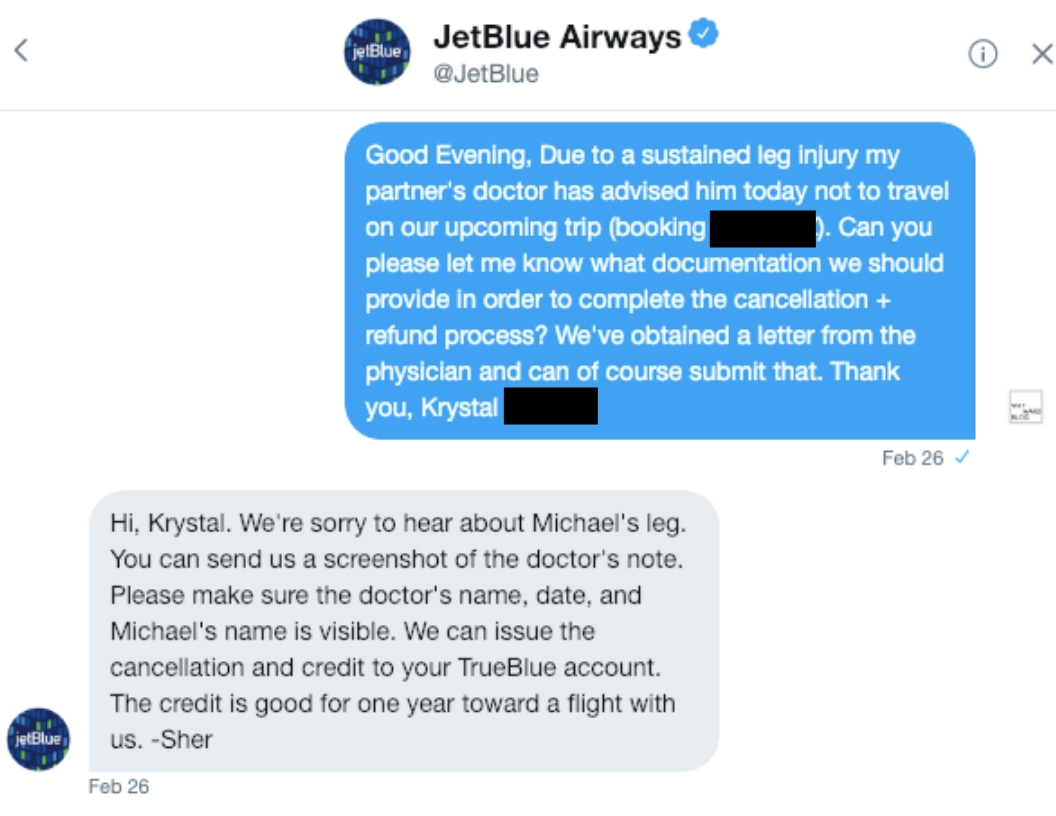Well, the inevitable happened: Michael and I had to cancel a trip unexpectedly.
As often as we travel, there was bound to be a time when something would prohibit us from taking a planned trip. Yet despite knowing this, we always book the non-refundable fare. You see, refundable plane tickets are often 3-4 times the price of their counterparts, and we can’t justify paying that much more for the same product (and if we did, we wouldn’t be able to travel nearly as often). So for us, two generally healthy adults, the gamble is worth it.
But – what happens when you can’t go on a trip, and you’ve booked the non-refundable option? Are you totally out the money? Well, each airline and lodging option has different rules, but you should know that non-refundable doesn’t always mean non-refundable. It may just mean you have more hoops to jump through to receive a refund or credit for the money you’ve spent, but all of this is dependent on the reason why you’re unable to travel. Did you have a change of heart and decide to change your weekend ski trip to a beach trip instead? You’re probably out the cost of your trip. Is there a legitimate health or family issue preventing you from traveling? You’ll have a better shot at recouping some or all of your travel costs.
CANCELING A NON-REFUNDABLE TRIP: A CASE STUDY
Last week Michael tore a muscle in his calf, rendering him unable to bear weight on his leg. Our trip to snowy Boston was only four days away, and though the orthopedic doctor provided him with crutches, we didn’t really feel comfortable about mixing crutches and icy sidewalks. By his follow-up appointment two days later we’d seen very little improvement, so we made the tough call to cancel our trip, which was now less than 48 hours away. Before leaving the doctor’s office, we had the foresight to ask for a note from the physician, which greatly assisted in us being fully refunded for our planned journey.
Once home, I reached out first to JetBlue via Twitter (which, in my experience, is the best way to resolve any issues with an airline – even The New York Times agrees). Within a few moments, I received a message from JetBlue asking for a photo of the doctor’s note. I sent it, and a few minutes after that I received another message confirming the flight cancellation and informing me that the credit is now available in my account to use within the next year. While sure, we might have preferred a cash refund, we also frequently fly JetBlue, so using this within a year will not be an issue.

Once the flight was canceled, I began looking into canceling our three Airbnb reservations. Two reservations had Cancellation Policies listed as “flexible,” which meant we would be refunded the total price we paid minus Airbnb’s fees (about $55 combined). Our third reservation, though, had a “moderate” policy, which meant that we were only due a refund of half of our second night’s accommodation price and cleaning fees (a refund of about $82 on a reservation that totaled almost $315). Ouch. So again, I took to Twitter to message Airbnb, and they opened a support case within the Airbnb platform. I provided a little more information and a photo of the doctor’s note, and the following day received updated refund invoices and a call from Airbnb support letting me know each reservation had been fully refunded.
Our last cancellation was the simplest: our car rental. The rental through Enterprise was not a prepaid rate and we never even had to provide a credit card number. We simply clicked through the reservation email to view and cancel our booking.
Great! Sure, it took a bit of effort, but considering that we could have been out over a grand, this was a pretty ideal ending to what had been a somewhat rough week.
But what if we hadn’t been refunded?
Our next step would have been to submit a claim with Chase, the credit card provider with whom we’d made our reservations. However, the process would not have been nearly as simple as sending a few messages back and forth.
First of all, Chase requires you to seek out refunds with the companies you booked through. Not every airline would have been as understanding as JetBlue (and if JetBlue hadn’t fully credited us back, we would have received a partial refund for our flights, and would have to submit a claim for the rest).
Additionally, Chase would have required us to ask our doctor to fill out a separate form – not simply provide a note from the doctor – which would have meant trying to find a time to visit the office again to obtain a signature in the days after Michael’s appointment. This means that you somehow need to know that your situation is going to be bad enough that you’ll need to cancel your trip before you visit the doctor, not the other way around. Then it’s likely we would have had to face a bureaucratic-length wait time to hear back, and perhaps be expected to respond with further documentation.
And, thankfully we’re domestic partners because otherwise, I’d have been on the hook for my expenses as a non-family member.

WANT TO ENSURE YOU’RE PROTECTED WHEN PURCHASING NON-REFUNDABLE FARES?
Unfortunately, illnesses, injuries, and death in the family can occur without warning; having to bear the financial burden of unused travel expenditures can make these tough situations even harder. Here’s what I suggest should the unexpected happen to you (though of course, I hope you never need to use these tips!):
Always book with a great credit card
While the credit card company may make you jump through hoops to receive a refund, your time and hassle may be worth it. Michael’s Chase card (P.S. – that’s my referral link) covers up to $10,000 in canceled travel expenses each year – well worth the annual $95 fee.
Consider travel insurance
While we’d typically only consider this on a longer trip, if you’re concerned about possible health issues or a death in the family, travel insurance can be a good investment (and don’t forget to read the fine print). It’s even an option now when booking flights on some airlines – spending a little now can be a huge help if you are concerned about potentially needing to cancel later.
Document everything
Keep a copy of your receipts and other documents; not just the ones with airlines and hotels, but any receipts from doctors’ offices or notices from funerals. Ask for a letter from your physician, and make sure it clearly lists the patient’s name, date of the letter, and signature and printed name of the physician.
Be aware of each company’s policy
The Terms and Conditions published on each business’s website can be confusing and take several read-throughs before the language becomes clear. Be sure you understand what your rights are, and what compensation you can expect to receive as outlined in their policy. This goes for both your travel expenses and any insurance/credit card benefits you are attempting to use.
And remember, the only dumb question is the one that isn’t asked: write down a list of all of your questions and give them a call if you’re confused about anything. One important note, multiple people on a reservation may not be eligible for a refund if they’re not immediate family members. This is just one reason why I recommend long-term partners consider officially registering as domestic partners if they are not married.
Reach out via social media and be direct but polite
The main point here is that you want everything in writing, as I’ve been told one thing from an airline’s phone representative only to find out what they said doesn’t apply.
I prefer reaching out over social media as responses are often faster than email (and hey – things can be addressed publicly if need be; image is everything in this day and age). Just be sure to take a screenshot of everything. I find that politeness goes a long way (after all, the folks on the other side of the screen are human, too), as does directness.
Attempting to address the problem with customer service together as a team and asking “what can be done” rather than “wondering if there’s a way” often nets better results.
Ask again, and ask differently
Told no? It’s not the end of the world. Try a different avenue, and be prepared to come up with an alternate solution if you’re told no yet again. Can’t get a refund? Try asking for travel credit in the value of your expenses. Can’t get that? Try asking for a voucher. Something is better than nothing, after all.
Wait until the last minute
If you’re convinced you don’t have a shot at getting a refund (say, you’re not sick enough to need a doctor’s note, but traveling isn’t the best idea when you’re so ill), the gamble of waiting until the last possible minute to cancel could pay off. Bad weather or other disruptions could result in the carrier or hotel canceling on you.
It’s definitely risky, but if you’re out of other options you don’t have much to lose. Just be sure you cancel right before the deadline; if you cancel you could receive a portion of a refund but if you no-show, you might not get anything.
Only ask for legitimate reasons
Please, please don’t ruin it for others. This was our first time canceling a flight, and only our second time canceling an Airbnb (the first was due to the presence of red tide in the region), and we only did so because our trip would involve lots of walking which my partner could not handle. We’d never abuse the courtesy of customer service, and I hope you’ll do the same.
Enjoyed this post? You may also like:
- 20 Questions You Should Ask a Potential Travel Partner Before You Leave Home
- How to Split Travel Costs When One Person Makes More Money
- 5 Easy Ways to Save Money This Week (for your next trip!)
- Dinner Party Survival Kit: 20 Travel-Themed Conversation Starters
- 5 Easy Things You Can Do Today to Save for Your Next Trip
- How to Find Cheap Flights
- 10 Things You Need to Know Before You Fly on Contour Airlines
- 14 Things You Should Know Before You Fly Frontier Airlines for the First Time
- 15 Things Travelers Should Know Before Flying Spirit Airlines for the First Time
- 13 Things You Should Know Before You Book a Flight With Avelo Airlines
- I won a trip! (Now what?)
- All Travel Guides by Destination
- Style Reviews Index
- Exclusive Discounts + Promo Codes
Have you ever had to cancel a non-refundable trip? If so, what was the outcome? What protections does your preferred credit card offer?



